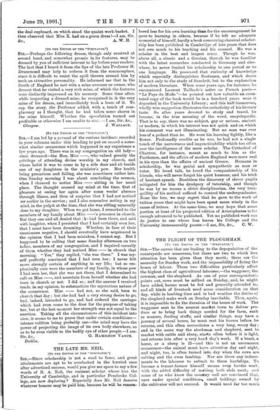THE LATE MR. NEIL.
[To THE EDITOR OF THE " SPECTATOR:1
Sr.R,—Since scholarship is not a road to fame, and great attainments are apt to be overlooked in the hurried race after advertised success, would you give me space to say a few words of R. A. Neil, the eminent scholar whose loss the University of Cambridge, and in particular Pembroke Col- lege, are now deploring ? Especially does Mr. Neil deserve whatever honour may be paid him, because he will be remem-
bered less for his own learning than for the encouragement he gave to learning in others, because if he left no adequate memorial of himself, hardly a book concerning clatsical scholar- ship has been published in Cambridge of late years that does not owe much to his teaching and his counsel. He was a scholar in the best and largest sense. Though he was, above all, a classic and a Grecian, though he was familiar with the latest researches conducted in Germany and else- where, he never limited his scholarship to one period or to one language. He possessed that curiosity of knowledge which especially distinguishes Scotsmen, and which drove him not only to the study of Sanskrit, but to the exploration of modern literature. When some years ago, for instance, he encountered Laurent Tailhe de's satire on French poets— "Le Pays du Mufle "—he pointed out how valuable an anno- tated copy of the book would be in a hundred years were it deposited in the University Library ; and this half-humorous, wholly wise suggestion illustrates the catholicity of his literary taste. So after years devoted to study and travel, he became, in the true meaning of the word, encyclopredic. That is to say, there was no subject, gay or serious, ancient or modern, in which his interest was not quick and on which his comment was not illuminating. But no man was ever less of a pedant than he. He wore his learning lightly, like a flower. Profoundly erudite as he was, he had not a single touch of the narrowness and impracticability which too often mar the intelligence of the mere scholar. The Cathedral of Chartres, for instance, meant as much to him as the Parthenon, and the affairs of modem England were more real in his eyes than the affairs of ancient Greece. Humane in scholarship, he was genial and sympathetic as man or tutor. He loved talk, he loved the companionship of his friends, who will never forget his quiet humour, and his trick of hesitant speech. Doubtless the discovery of clever pupils mitigated for him the drudgery of tutorship, and though he was by no means a strict disciplinarian, the very tran- quillity of his method sufficed to control the undergraduates. None the less, we may regret that he gave to the work of tuition years that might have been spent more wisely in the cause of letters. At the same time, we may hope that some portion at least of his projected edition of Aristophanes is far enough advanced to be published. Yet no published work can do justice to one whose loss leaves his College and the
University immeasurably poorer.—I am, Sir, &c., C. W.




















































 Previous page
Previous page